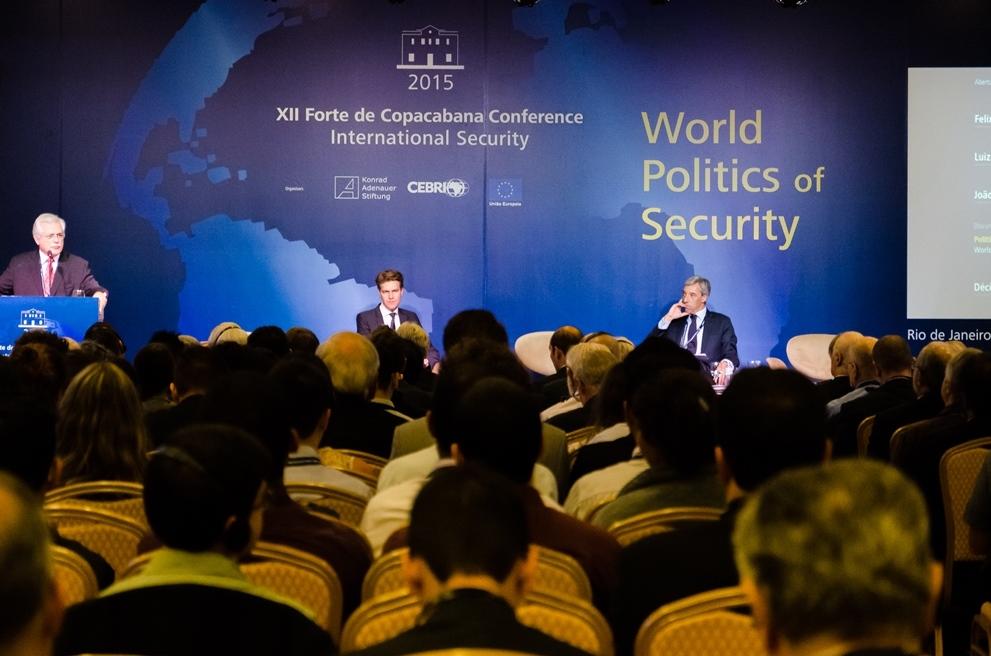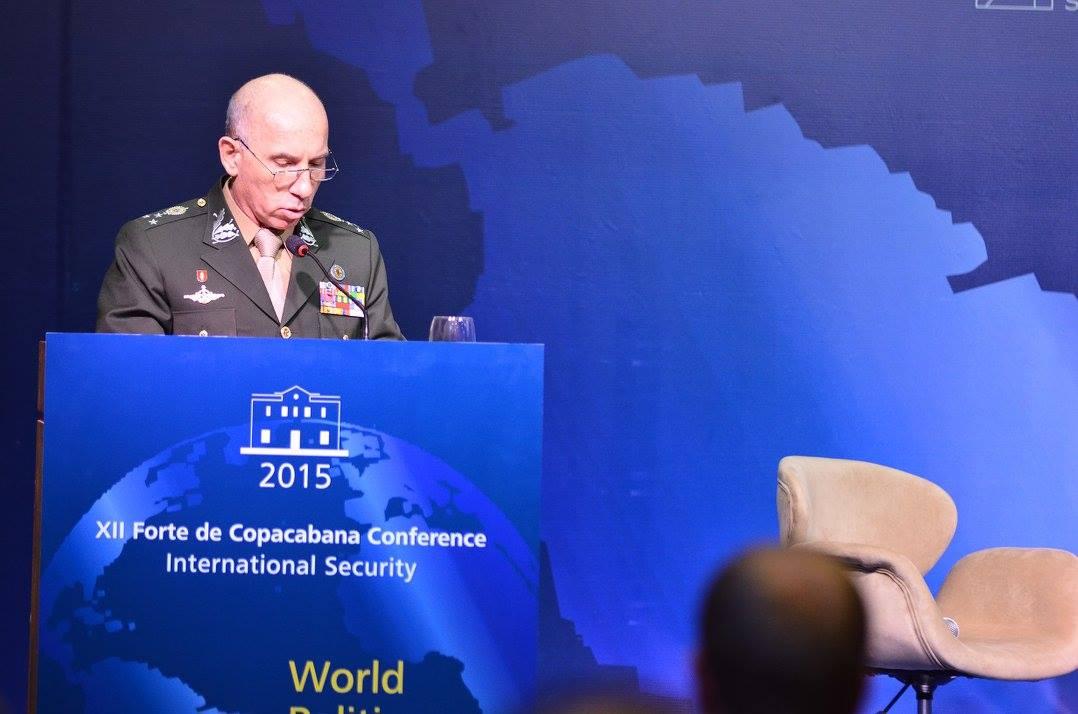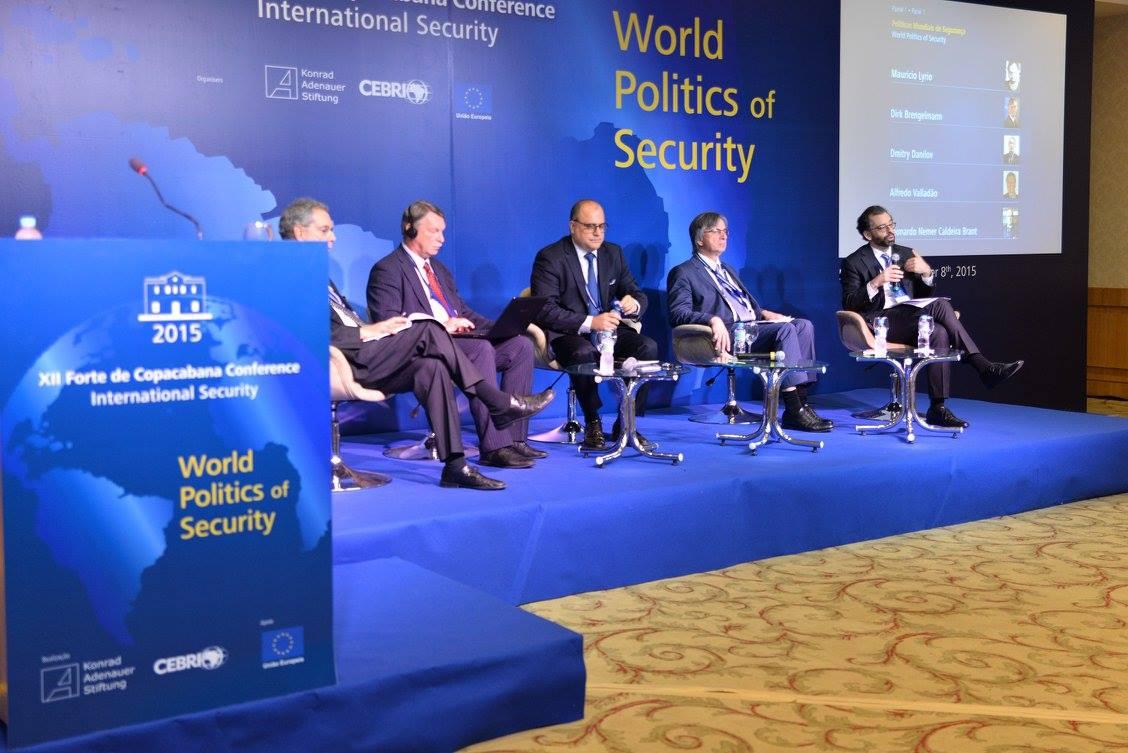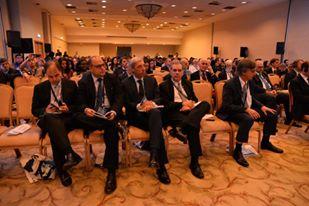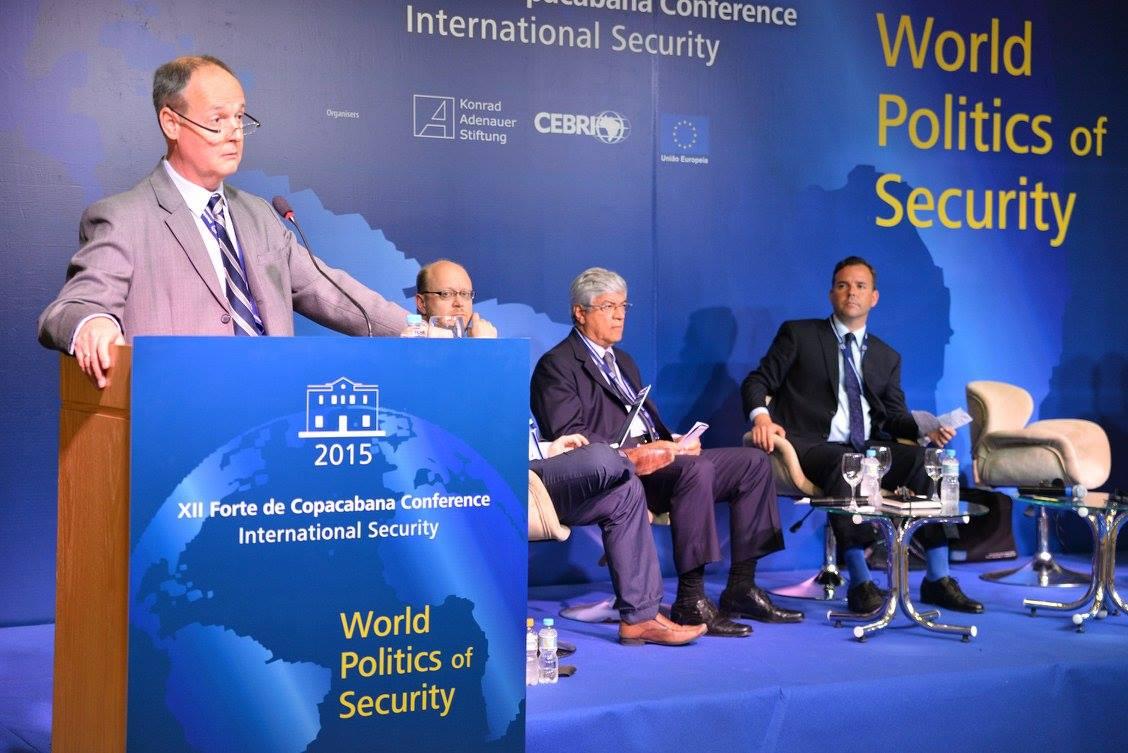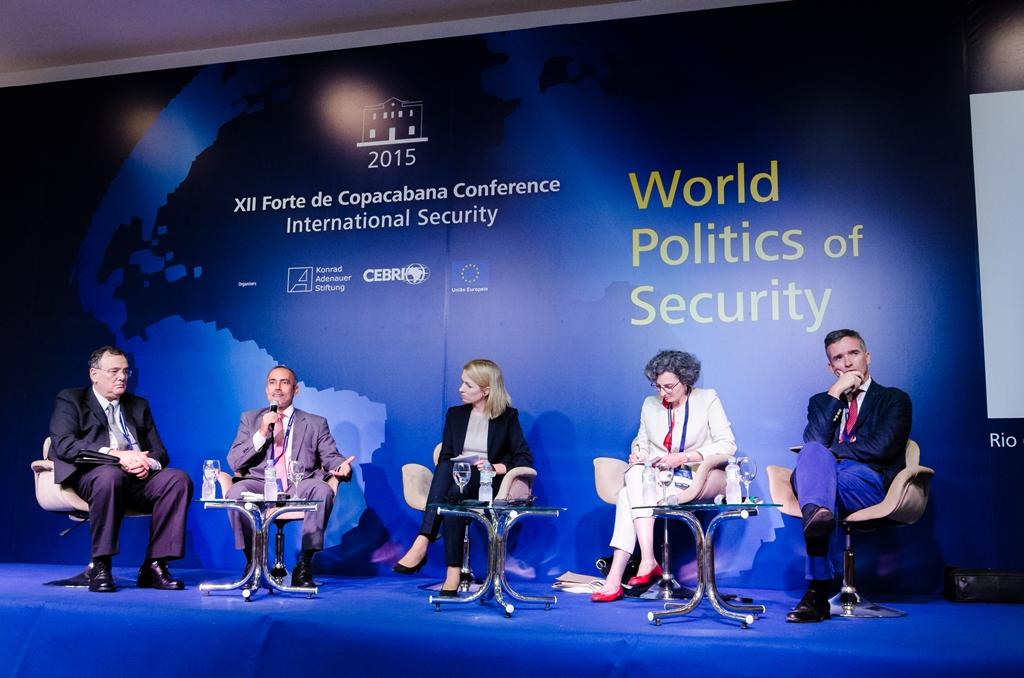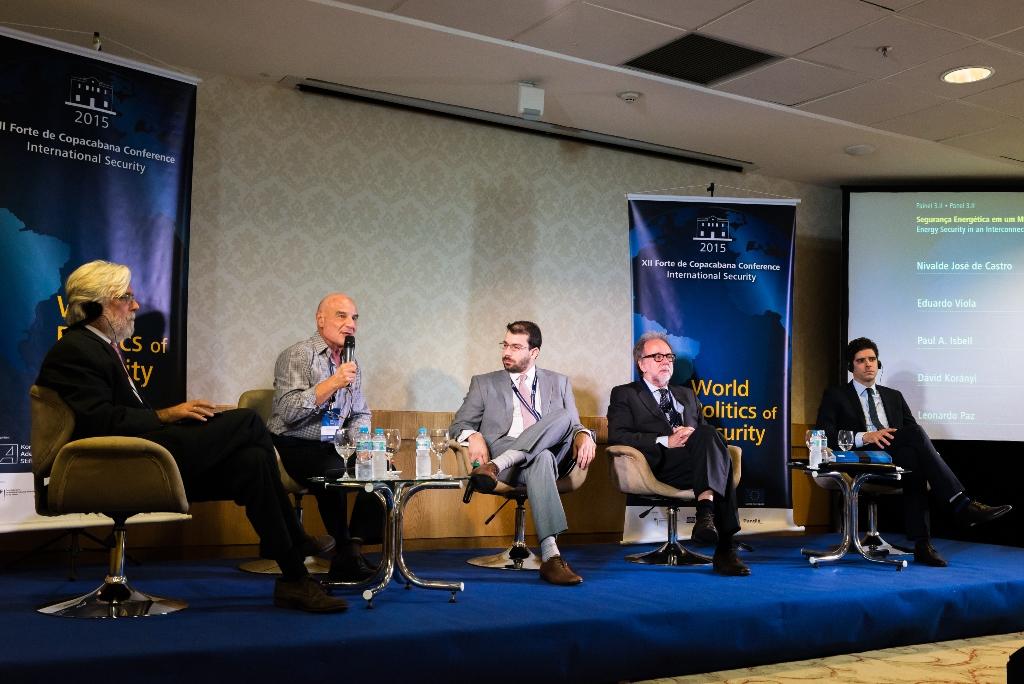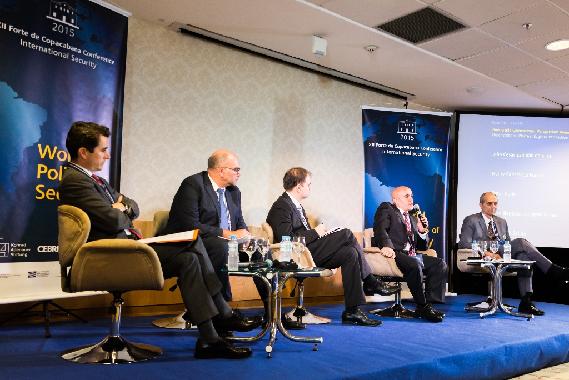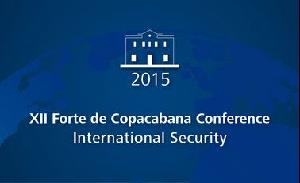The XII Copacabana Security Conference focussed upon the umbrella topic: "World Politics of Security", contributing to the development of the ongoing dialogue between decision-makers and opinion shapers of North and South on security matters - particularly those between Europe and Latin America.
At the centre of discussions were questions on global order, international values, the dichotomy of the particular and the universal within world politics, as well as the security structure Latin America and Europe would like to see implemented globally. Presented in five thematic panels, questions of the role of democratic Brazil and Europe in the architecture of world security architecture were analysed. The specific value frameworks Europe and Latin America (with a particular focus on Brazil ) would wish to see structuring order in an increasingly multipolar world was an integral element reflected in the contributions of the various speakers and further investigated and discussed by the professional audience in subsequent Q & A sessions. Brazil and Europe share common values and ideals in the organisation of their domestic orders, yet, as the participants found, this does not necessarily translate into a blueprint for a concerted approach in the domain of global security policy.
The conference was opened by Felix Dane, director of KAS Brazil ad interim, Ambassador Luiz Augusto de Castro Neves (CEBRI Vice-President) and the EU ambassador to Brazil, João Gomes Cravinho. The EU ambassador in his introductory remarks presented the new EU global strategy on foreign and security policy. During opening remarks, each host provided a brief analysis from their perspective as to the state of health of the world politics of security. The hosts agreed the last decade has seen a deterioration regarding global stability and a relative retreat from peace. Conflicts have proliferated, and large parts of the world are now subject to protracted violence and insecurity. Indeed, the many local conflicts in Africa, the Middle East, Eastern Europe and elsewhere have had a colluding effect, whereby weakening the global order as a whole. The effects a global order that is thus no longer cohesive and firm as just few years ago are felt by Brazil and Europe – as by all others around the world alike. According to the hosts, a return to a just and sustainable order must stand at the centre of the world politics of security, . At the core of the problem the conference sought to address, was therefore how such an order that the international society of states could accept and defend in unison would look: What are the core values and principles of this desired order and what do they mean? How should they be arranged in relation to each other? All agreed that a concerted approach to the world politics of security remained elusive and ultimately inefficient as long as the great powers find themselves in positions that diverge on matters of values and principles. To find common positions through dialogue and debate is thus what the hosts called for in closing.
As opening contributions, the perspectives and strategies of Brazil and the European Union in world politics were presented to the broad audience. Ambassador Cravinho, who was first to speak, said that the theme of the conference was of highest relevance for the European Union, as the block is now in a process of crafting a new landmark strategy white paper on foreign and security policy. The last time the European Union had issued such a strategy paper was in 2003. The paper then, reflecting a different world - a more peaceful world - was permeated by ideals that envisioned the arrival of an age in which political realism and material prowess would become obsolete. The paper did make some significant contributions, such as advancing the notion of security by widening and deepening the understanding of the concept, and by having foreseen a number of trends– such as the fundamental instability of the dictatorial regimes in place in many parts of the Maghreb region and the Middle East. Yet by building on a post-modern approach, classical power considerations were largely left aside, and the European Union thus was left without the policy tools and material capabilities to deal with the world as it is today. Indeed, the European Union is in the current situation of often being unable to deal with facts on the ground, since it does not dispose of the means necessary to achieve desired ends.
The new strategy white paper, to which the ambassador refers to is being elaborated at a time the necessities of the moment –conflict in the Middle East, the Ukraine crisis, and other pressing current events - demand more concrete policy tools and more sophisticated material capabilities. For whereas the authors of the 2003 EU security paper faced a more peaceful and stable world, and could thus push in directions as desired, the nature of current times demands a return, to some degree, to the premises of political realism. The European Union remains committed to a value framework that sees liberty and humanitarianism at its core, yet the Union also recognizes that material capabilities must be elevated to a central role within the Union should the bloc desire to remain a relevant actor in the context of an ever more dangerous world.
Moreover, the Ambassador said that it was well understood that the deteriorating global security situation affects all states around the world and that unilateral reactions to the changing environment may lead to other security problems as in part can be observed in the case of Russia and its strategy towards world politics of security. He thus said that while the EU intendeds to strengthen its ability to act, it does so while considering the interests and needs of its neighbours. As such, the EU will remain committed to the Balkans, and remain engaged with Russia, North Africa and the Middle East. On a global level, according to the Ambassador, the EU will continue to work towards an open and free world in which human rights and liberty are given a key position within the complex of other values which ultimately underlie order.
Following the European perspective, the Brazilian view was presented by General Schons. Schons started by defining the terminology of security. He argued security could be described as more like a feeling – a state of being, while defence denotes concrete action, often involving coercive force. He reminded that although security in Brazil is obviously of great concern to the population, , it is almost exclusively understood in a domestic, national context. In response to earlier remarks that Brazil was behaving as if it were apart from the problems of the world, an island cut off from the centre of world affairs, Schons said there was indeed little consciousness within the general Brazilian public that security problems in another part of the world could directly influence the well-being of the Brazilian nation. He added however, that in order to raise public awareness on matters concerned about world politics of security, conferences such as this one were of upmost value to Brazil.
Schons continued by reflecting on the strategic culture that underpins the Brazilian approach to foreign and security policy. He held that whereas in many other parts of the world realism has an important role as the guiding rationale, in Brazil, it is idealism and constructivism that attain a more central role. Yet echoing the view of Cravinho, he added that Brazil is forced by circumstances to tailor its means to its necessary ends. Looking back at a long process, he went on to explain that in the wake of the cold war, the Brazilian armed forces had been weakened considerably. Citing Francis Fukuyama’s “The end of History”, he said there was a general consensus, in Brazil and beyond, that the military no longer had a role to play. When looking back at the past decade we can see this world view has changed drastically. Schons summed this process up under the idea of the return of the state: Whereas in the 90s it was thought that the state itself would become obsolete and markets would reign supreme, today it is the reverse that is true. And with the state returning to world politics, so did concepts such as sovereignty, territory, borders and the legitimacy of the use of force.
Looking at the global picture, Schons argued Brazil is no world power and thus cannot aspire to play a central role in the world wide context and that Brazil’s contribution comes in the form of retaining the region of South America stable and at peace. Brazil and her partners consolidated the regional security architecture through the relatively new organization of UNSUR. Through this organization, the states of the region are able to restrain arms races, to coordinate policy outlooks, and to coordinate their efforts in the fight against organized crime, such as drug and human trafficking. Building on this later point, Schons went on to say that Brazil and Latin America had long struggled with these challenges – transnational crime – and thus was in a position to share its experiences with others around the world. He concluded by stating that Brazil would remain committed primarily to the South American continent, while assisting and participating in international mission’s within the opportunities as presented.
Officials on behalf of their respective institutions presented their positions and this was followed by the commencement of the conference debates. The event was organized into five thematic panels. These dealt with a diverse array of issues key to the world politics of security: configuration of the international system; concept of state sovereignty, territory and nation state; regional and global perspectives relating to unconventional warfare; prospects for concerted efforts on the world politics of security; and energy security in an interconnected world. These formed some of the starting points for the many vigorous debates. International experts vigorously debated in the talk-show format, allowing for more informal exchanges rather than scripted speeches. Moreover, in addition to the moderators and the speakers, the audience was equally given the chance to actively intervene and participate in discussions.
For the first time it was possible to attend the conference via live internet streaming from any internet-enabled device via the link: forte2015.com. The videos are currently being processed and will be made available on this website in due course.



